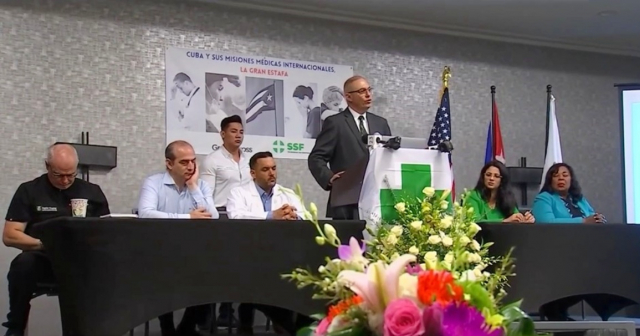The United States will restrict visas to officials and employees of those governments and organizations that contribute to the "trafficking of Cuban doctors", among other measures recently approved as part of theLaw of State Appropriations, Foreign Operations and Related Programs for Fiscal Year 2024.
This was announced by the Cuban-American congressmanMario Díaz-Balart in a press conference held this Wednesday, where he also reported the increase in the budget ofRadio and TV Martí provided for in that legislation, as well as theban on the use of federal funds for small businesses in Cuba (callsMSMEs) linked to the regime.
At the end of March, theUnited States Congress passed a billin support of democracy in Cuba which included these measures under the title of the Consolidated Additional Allocations Law 2024, written by Díaz-Balart.
The text proposed the allocation of 25 million dollars to finance the promotion of democracy in Cuba, which represents an increase of 25% compared to previous years. In addition, it included the proposal to allocate another 25 million dollars for the Transmission Office to Cuba, which includesRadio and TV Martí.
With the approval this Wednesday by theUnited States Senate of the final financing package for fiscal year 2024 (with an overwhelming vote of 74 to 24), the doors are opened to finance the policies to promote democracy in Cuba contemplated in the Díaz-Balart proposal.
The Law on State Appropriations, Foreign Operations and Related Programs (SFOPS) for fiscal year 2024provides $58.346 million in total financing for himDepartment of State, the United States Agency for International Development (USAID) and other essential related programs.
“The FY24 SFOPS bill invests in America's engagement, competitiveness, and global leadership at a crucial time when our role on the world stage is being questioned,” stated SenatorChris Coons (D-DE), Chairman of the Senate Appropriations Subcommittee on State, Foreign Operations and Related Programs.
For her part, the senatorPatty Murray (D-WA), chair of the Senate Appropriations Committee, considered that “this bill rejects dramatic cuts that would have abdicated American leadership and abandoned key commitments we have made to our partners and allies” and recognized that “investing in diplomacy, in our alliances and in the construction of a safer and more prosperous world is an investment in our security and national competitiveness.”
The bill includes $11.8 billion for the State Department and USAID to carry out their vital mission around the world and continue to invest in the modernization of their workforce in the field of diplomacy and development.
Furthermore, within the framework of promoting human rights and democratic governance, the bill continues dozens of provisions that address global fragility and reflect values by strengthening good governance and protecting human rights, including funding for the International Criminal Court as it files charges against senior Russian officials, including the presidentVladimir Putin, for committing war crimes in Ukraine.
Cuban medical missions
The United States governmentkeeps Cuba on the “black list” of human trafficking, considering that it fails to comply with the standards set by law for the protection of victims and preventing this form of trafficking.
The Cuban regime has been singled out in the chapter dedicated to human trafficking organized by the country's own authorities. Along with Russia, Syria or Iran, the Biden administration includes Cuba among the countries grouped in the chapter “When the government is the trafficker: State-sponsored human trafficking.”
“Some governments are part of the problem, directly forcing their citizens into sex trafficking or forced labor… To extract the benefits of this work or service, governments coerce by threatening to withdraw public benefits, withholding wages, threatening to punish family members, or conditioning services, food or freedom of movement,” the document indicated.
In the case of Cuba, the United States government identified a “documented policy or pattern regarding human trafficking in government-funded programs.”and forced labor in government-affiliated medical services”.
In that sense, in its 2022 Human Trafficking Report, the United States highlights that during the period studied there was a "government policy or pattern of benefit" from worker export programs "with strong indications" of forced labor.
Cuban medical missions in other countries constitute for the State Department a clear example of human trafficking. Havana "continued to deploy Cuban workers to foreign countries using deceptive and coercive tactics" and without addressing "labor violations and traffic crimes," the report said.
Among other allegations, the US accused Cuba of failing to inform participants in those programs about the terms of their contracts, which vary from country to country. They also confiscated their passports, professional accreditations and salaries, and threatened health professionals and their families if they abandoned those missions.
What do you think?
SEE COMMENTS (2)Filed in:
